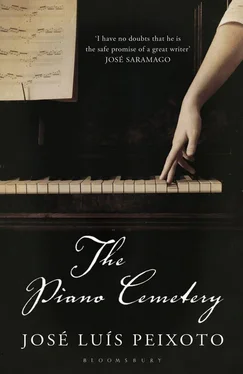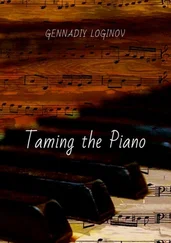With the speed of the truck a breeze passed Marta’s face which ruffled her hair, but her cheeks were coloured a vivid red. Her lips were pressed together in a line.
When my wife comes back into the kitchen, the muscles of her face tense. She says:
‘Marta has asked me to go and spend the weekend at her place.’
Maria keeps eating, leaning over her plate, in silence. A spinach leaf slips from her spoon but she moves her head, swallows the spinach leaf and then the spoon of broth and continues eating, leaning over her plate, in silence.
I wasn’t surprised when I went into the piano cemetery to look for some part and, lifting the lid of one of the pianos, found piles of Maria’s romance novels. I knew very well that Maria would escape from her mother and spend hours sitting in a corner of the piano cemetery, leaning over a book which rested on her knees. When this habit began, my wife worried a great deal and said to me:
‘I don’t know what Maria was up to all this afternoon. I asked her and she didn’t want to tell me.’
As soon as I realised what was going on I calmed her down. She only spoke of it again when she was angry:
‘So you have no trouble hiding yourself away to read your romance novels, but when it comes to helping out. . Or did you think I didn’t know?’
My wife would say this because she knew it hurt her. The romance novels were the secret everyone knew but which everyone respected as a secret.
If any of my children had continued with their studies, Maria would have been the one who would have got furthest. She was always the most dedicated.
Those were evenings when I would be doing something silent behind my bits of wood. I would hear her steps on the pine shavings that covered the patio floor, raise my head slightly and see her with her books hidden under the dress altering the shape of her body, squaring her belly or her rump or her shoulders.
Later, when I lifted the lid of one of the pianos, I would find piles of romance novels. The books were written in Brazilian Portuguese. They made up collections with women’s names — Sabrina, Bianca, Júlia. Reading the authors’ names my daughter would imagine women in love, who knew life — Rosemary Carter, Violet Winspear, Anne Mather, Vanessa James, Lynsey Stevens, Elizabeth Pretty, Ann Cooper, Penny Jordan, Casey Douglas, Rebecca Stratton, Flora Kidd, Jane Donnelly, Linda Harrel, Rachel Lindsay, Essie Summers, Katrina Britt, Amanda Carpenter, Anne Hampson, Janet Dailey, Marjorie Lewty, Carole Mortimer. Before she started reading my daughter would select a solemn voice and in the silence of the piano cemetery would whisper the title of the book she was holding: Lost in Love, A Time for Love, Only a Woman, The Perilous Rival, No Way Back, The Seduction Game, It All Happened in Paris, Love without Marriage, The Man of Steel, Afraid to Love, The Stranger from Next Door, Slave to Pride, Sublime Obsession, Stolen Heart . And she would enter a world of envy and love, of pride and love, of fear and love, of jealousy and love, of betrayal and love, with strong, sensitive women she would never forget, and who were called Cherry, Vic, Laura, Helen, Jane, Polly, Kate, Casey, Sarah, Raine, Luenda, Rose, Sally, Lee, Sophy, Jensa, Brooke, Viviane, Magda, Robyne, Madeline; with handsome coiffed men who smiled in the enamoured photos on the jackets and who were called Max, Gwill, Mark, Rick, Brandon, Flint, Marcus, Adam, Jeremy, Leon, Karl, Magnus, Ric, Nick, Cole, Dean, Kley, Robert. And hours would go by like that, afternoons would go by like that. In the final pages, after all the frights, bad omens, obstacles, when it seemed impossible, Maria would give a long sigh because she once again believed what she had never stopped believing — that pure, true love always triumphs.
Through all the nights of that summer, the stars were liquid in the sky. When I looked at them, they were shining liquid points in the sky.
The first time, we met during the day — I smiled at her, she smiled at me. We said two or three words and held ourselves back within our bodies. Her eyes, for a moment, were an abyss where I was surrounded by a luminous lightness, where I fell as though floating — falling through the sky within a dream.
That night I waited for her, leaning against the wall, a few metres before the entrance to the boarding house. The people passing were happy. I was thinking about something that made me feel bigger inside, like the night. The ivy leaves that covered the top of the wall, and which hung over the pavement, were a single nocturnal shape, made only of shadows. First I felt the ivy leaves being moved; then, I saw her arms grasp the wall; then, her face still against the bright night-time sky. And my heart missed a beat. The world stopped. Shadows rested, transparent, on the skin of her face. The fresh air, cooled, moulded the skin of her face, and the world continued. I helped her down. We ran along the pavement hand in hand. My hand enveloping her slender hand, the strength of her fingers in mine. At night, our bodies running side by side. When we stopped — our breathing, our faces wondering at one another — we looked at one another as though seeing one another for ever. When my lips slowly approached her lips and we kissed, there were shining reflections, like dust thrown into the air, falling through the night that covered us.
Later, there were interminable days which I spent alone at the workshop. In July, for the first time, I repaired a piano without any help — the upright piano of a lady with children and grandchildren.
‘It’s not for me any more. It’ll be for my grandchildren,’ she said.
Later, there were the men from the taberna never asking me about my uncle, and me remembering less and less to ask them about him. There were whole days, and whole nights.
As soon as I awoke, I pushed away the sheet and remained sitting on the bed, watching the first light coming through a slit in the window, and I knew that during that summer the days had neither a beginning nor an end. Time was a permanent succession which didn’t stop with the night. I would get up slowly, drawing shapes with my movements and beaming at the clothes I put on. When I went out into the street the city was misty shapes that were reborn and perhaps, perhaps, happiness was within its reach. I would arrive at the big workshop door, and as I went in, even before going in, I would begin to count the time that separated me from her. However, I was comfortable in the workshop. In front of me I had wood, and I had the peace of knowing the shape I wanted to give it, and of knowing just how to give it that shape. In front of me I had the piano of a lady with children and grandchildren, there was a keyboard and my finger resting on a key, and inside a note I would never know — a single note — the whole space of everything I wanted to imagine — her face — her face — her face. It was morning, and for some moments I saw only the image of her face, I could hear her voice, and it was still morning, I saw her again with the same face, and it was still morning, I saw her again, and heard her, and it was lunchtime. In the afternoons, too, I lived between dreams. With just a few differences it was like when I was five or six and my mother sweetly let me sleep on Saturday mornings — there was sun beyond the window and I would go on waking and sleeping, thinking dreams and dreaming ideas.
I would go into the taberna when, after the afternoon, before the night, the dark blue colour would fall over everything — the workshop’s earthen path. The sounds of the city, distant, came through the dark blue. I would drink three or four, or five, glasses of wine because it was still too early to arrive home to get myself ready. That was the time each day that I just allowed to pass. I didn’t worry about existing. The marble countertop wasn’t important, nor the men’s toothless smiles, nor the men’s limping conversations. I witnessed everything, unconcerned, light, I smiled easily. I existed during that time that I allowed to pass, that I barely felt, but I existed far away. I returned to my body when I left the taberna ; it was too early when I arrived home and, without eating, began to get myself ready. Hours passed, dimly lit. In the bathroom mirror, my face.
Читать дальше












